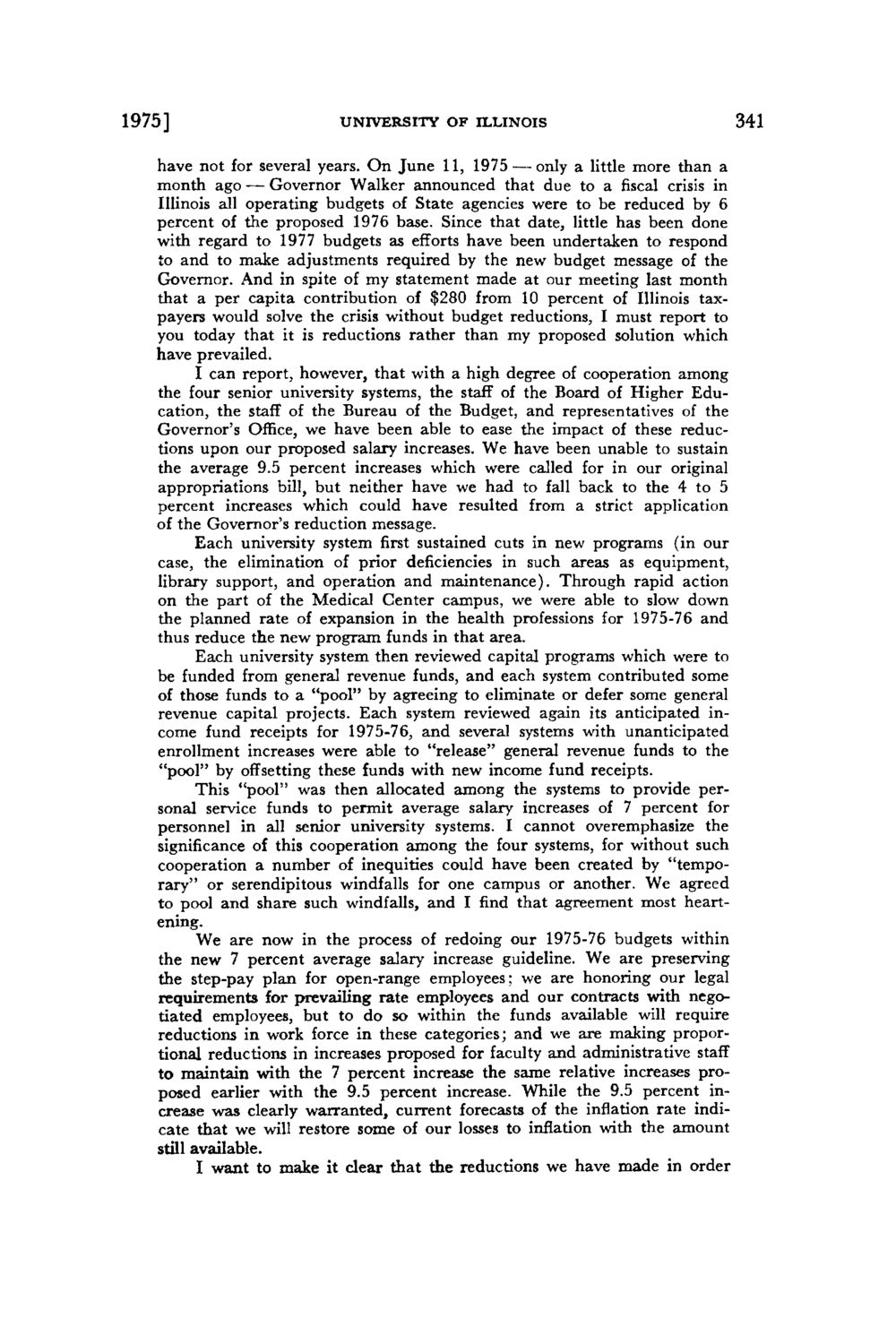| |
| |
Caption: Board of Trustees Minutes - 1976
This is a reduced-resolution page image for fast online browsing.

EXTRACTED TEXT FROM PAGE:
1975] UNIVERSITY OF ILLINOIS 341 have not for several years. O n June 11, 1975 — only a little more than a month ago — Governor Walker announced that due to a fiscal crisis in Illinois all operating budgets of State agencies were to be reduced by 6 percent of the proposed 1976 base. Since that date, little has been done with regard to 1977 budgets as efforts have been undertaken to respond to and to make adjustments required by the new budget message of the Governor. And in spite of my statement made at our meeting last month that a per capita contribution of $280 from 10 percent of Illinois taxpayers would solve the crisis without budget reductions, I must report to you today that it is reductions rather than my proposed solution which have prevailed. I can report, however, that with a high degree of cooperation among the four senior university systems, the staff of the Board of Higher Education, the staff of the Bureau of the Budget, and representatives of the Governor's Office, we have been able to ease the impact of these reductions upon our proposed salary increases. We have been unable to sustain the average 9.5 percent increases which were called for in our original appropriations bill, but neither have we had to fall back to the 4 to 5 percent increases which could have resulted from a strict application of the Governor's reduction message. Each university system first sustained cuts in new programs (in our case, the elimination of prior deficiencies in such areas as equipment, library support, and operation and maintenance). Through rapid action on the part of the Medical Center campus, we were able to slow down the planned rate of expansion in the health professions for 1975-76 and thus reduce the new program funds in that area. Each university system then reviewed capital programs which were to be funded from general revenue funds, and each system contributed some of those funds to a "pool" by agreeing to eliminate or defer some general revenue capital projects. Each system reviewed again its anticipated income fund receipts for 1975-76, and several systems with unanticipated enrollment increases were able to "release" general revenue funds to the "pool" by offsetting these funds with new income fund receipts. This "pool" was then allocated among the systems to provide personal service funds to permit average salary increases of 7 percent for personnel in all senior university systems. I cannot overemphasize the significance of this cooperation among the four systems, for without such cooperation a number of inequities could have been created by "temporary" or serendipitous windfalls for one campus or another. We agreed to pool and share such windfalls, and I find that agreement most heartening. We are now in the process of redoing our 1975-76 budgets within the new 7 percent average salary increase guideline. We are preserving the step-pay plan for open-range employees: we are honoring our legal requirements for prevailing rate employees and our contracts with negotiated employees, but to do so within the funds available will require reductions in work force in these categories; and we are making proportional reductions in increases proposed for faculty and administrative staff to maintain with the 7 percent increase the same relative increases proposed earlier with the 9.5 percent increase. While the 9.5 percent increase was clearly warranted, current forecasts of the inflation rate indicate that we will restore some of our losses to inflation with the amount still available. I want to make it clear that the reductions we have made in order
| |